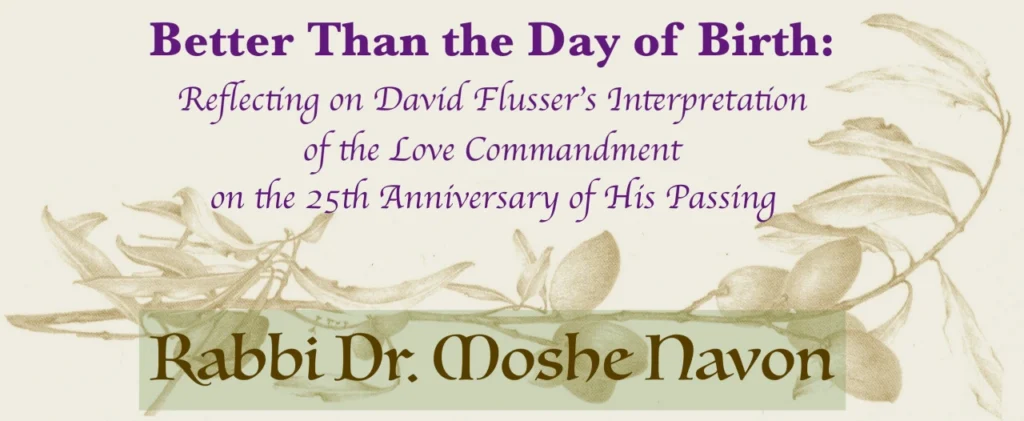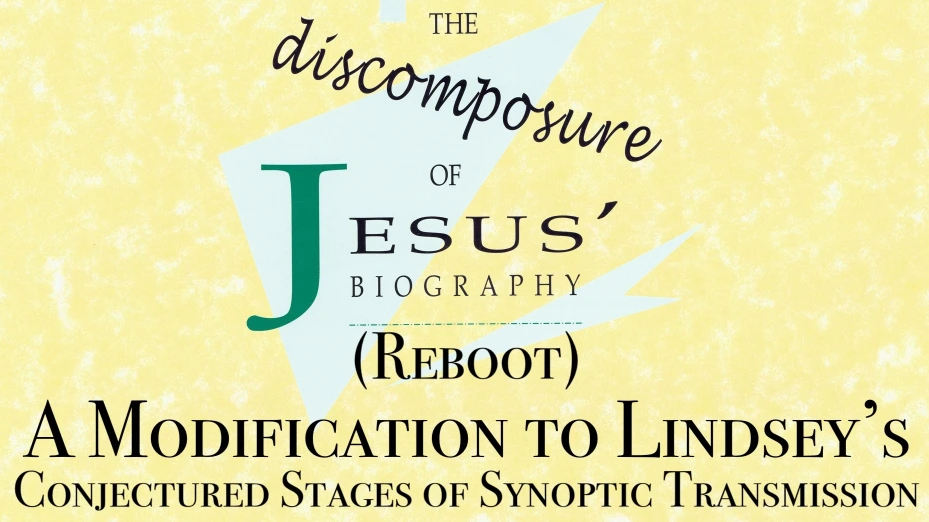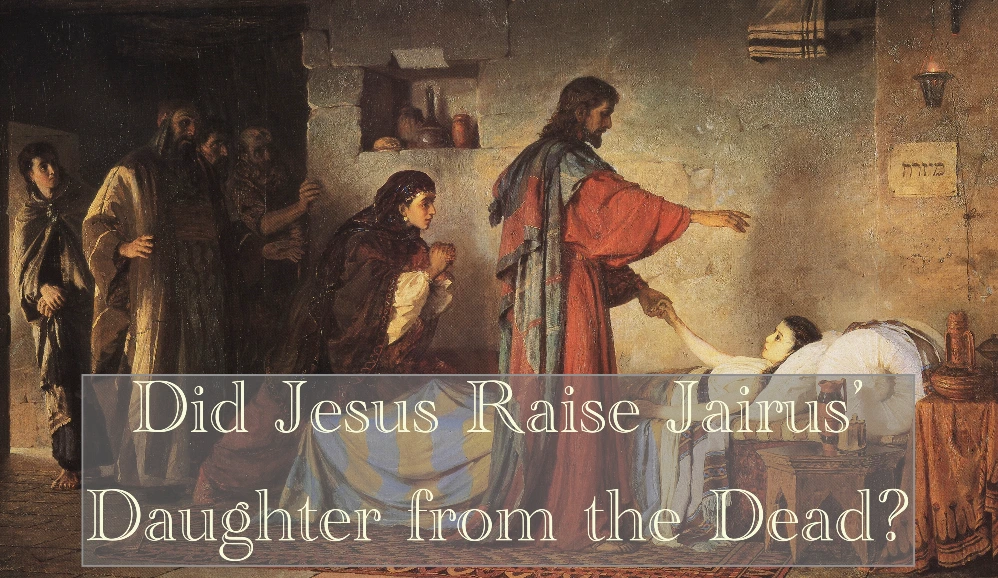| “No Jew ever called God abba, yet the evangelists record that Jesus always called God abba, ‘my Father’ (except for the cry from the cross, Mark 15.34).”
—Joachim Jeremias (emphasis original)[1] |
At first glance, the title of this article might seem to pose a preposterous question. “Of course Jesus called God ‘Abba,’” one might exclaim. “It says so in the New Testament!” That “Abba” was Jesus’ favorite term for addressing God is often taken for granted by laypersons and scholars alike. Some scholars have asserted that whenever Jesus addressed God as “Father” in the Gospels, this always goes back to an original “Abba.”[2] Moreover, Jesus’ use of “Abba” in prayer has been cited as evidence that Jesus attained a level of intimacy with God that was not possible within the confines of Second Temple Judaism.[3] It has even been claimed that calling God “Abba” would have been considered offensive, and perhaps blasphemous, to Jesus’ Jewish contemporaries.[4] At other times, scholars have pointed to Jesus’ use of “Abba” as evidence that Jesus spoke Aramaic rather than Hebrew.[5] All of this is a heavy load for one little word to bear, and it is for this reason that it makes sense to re-examine the evidence regarding Jesus’ use of the term “Abba.”
The Evidence for Jesus’ Use of “Abba”
In the past, scholars who defended the notion that Jesus always used the term “Abba” when addressing God as “Father” usually made their case in the following manner: In the first place, scholars claimed that the form אָבִי (’āvi, “my father”), which was the usual way for addressing one’s father in Biblical Hebrew (cf., e.g., Gen. 22:7), had become obsolete by Jesus’ time, having been completely replaced by the form אַבָּא (’abā’, “father”).[6] Thus, if Jesus had wanted to address God as “Father,” either in Hebrew or Aramaic, there was no alternative but to call him “Abba.” In the second place, scholars cited Jesus’ prayer in Gethsemane (where Jesus is reported as saying, “Abba, Father, all things are possible for you” [Mark 14:36]) as proof positive that Jesus did, indeed, call God “Abba.” Finally, these scholars traced the practice of calling out to God as “Abba, Father” among the Greek-speaking non-Jewish believers (Rom. 8:15; Gal. 4:6) back to Jesus. These scholars argued that since “Abba” was a foreign word, the only reason why these non-Jewish Greek-speakers would call God “Abba” was that they did so in imitation of Jesus, whose practice of addressing God in this way had transformed “Abba” into a sacred word.[7]
These arguments would be formidable if they were factual. Upon closer examination, however, we discover that these arguments are at best founded on baseless assumptions, and at worst are wholly erroneous. We will examine these arguments in reverse order, proceeding from the least egregious to the most.
Paid Content
Premium Members and Friends of JP must be logged in to access this content: Login
If you do not have a paid subscription, please consider registering as a Premium Member starting at $10/month (paid monthly) or only $5/month (paid annually): Register
One Time Purchase Rather Than Membership
Rather than purchasing a membership subscription, you may purchase access to this single page for $1.99 USD. To purchase access we strongly encourage users to first register for a free account with JP (Register), which will make the process of accessing your purchase much simpler. Once you have registered you may login and purchase access to this page at this link:
Check out these recent JP articles:
- Like Every Sparrow Falling: The Symbolism of Sparrows in a Saying of JesusThe multivalent image of the sparrow in ancient Jewish thought made it a useful vehicle for conveying messages about human and divine relationships.
- Better Than the Day of Birth: Reflecting on David Flusser’s Interpretation of the Love Commandment on the 25th Anniversary of His PassingI regard the twenty-fifth anniversary of David Flusser’s passing not solely as a day of loss, but also as the day that gave him to the world.
- 25 Years Since David Flusser’s PassingProfessor Serge Ruzer shares his recollections of Israeli scholar David Flusser on the twenty-fifth anniversary of his death.
- The Discomposure of Jesus’ Biography (Reboot): A Modification to Lindsey’s Conjectured Stages of Synoptic TransmissionHow did the Hebrew biography of Jesus disintegrate into the isolated pericopae that make up the Synoptic Gospels?
- Was the Hemorrhaging Woman Jesus Healed Named Rebekah?Is it possible to retrieve the name of the woman who touched Jesus’ tzitzit?
- Did Jesus Raise Jairus’ Daughter from the Dead?Should readers give more weight to the bystanders’ impressions or to the words Jesus said?
And check out these items from the JP Bookstore:
-
Jesus’ Gospel: Searching for the Core of Jesus’ Message
$12.95 Price incl. tax: $12.95 Add to cart -
A Hebrew Translation of the Gospel of Mark
$0.00 Price incl. tax: $0.00 Add to cart -
Sale!
Treasures New and Old (Matt. 13:52): Celebrating 35 Years of Jerusalem Perspective
Original price was: $24.95.$19.95Current price is: $19.95. Price incl. tax: $19.95 Add to cart -
The Kingdom of Heaven by Joseph Frankovic
$0.00 Price incl. tax: $0.00 Add to cart
- [1] Joachim Jeremias, The Prayers of Jesus (trans. C. Burchard and J. Reumann; London: SCM, 1967), 111. ↩
- [2] See, for instance, Gustaf H. Dalman, The Words of Jesus Considered in the Light of Post-Biblical Jewish Writings and the Aramaic Language: I. Introduction and Fundamental Ideas (trans. D. M. Kay; Edinburgh: T&T Clark, 1902), 191-192; Joachim Jeremias, New Testament Theology: The Proclamation of Jesus (New York: Charles Scribner’s Sons, 1971), 65. ↩
- [3] See Gerhard Kittel, “ἀββᾶ,” in The Theological Dictionary of the New Testament (ed. Gerhard Kittel and Gerhard Friedrich; trans. Geoffrey W. Bromiley; 10 vols.; Grand Rapids: Eerdmans, 1964-1976), 1:6. ↩
- [4] See Jeremias, New Testament Theology, 67. ↩
- [5] For scholars who have argued that Jesus’ use of “Abba” points to an Aramaic original of the Lord’s Prayer, see, for instance, W. D. Davies and Dale C. Allison, Jr., A Critical and Exegetical Commentary on the Gospel According to Saint Matthew (3 vols.; ICC; Edinburgh: T&T Clark, 1988-1997), 1:593; Ulrich Luz, Matthew: Hermeneia—A Critical and Historical Commentary on the Bible (3 vols.; trans. James E. Crouch; Minneapolis: Fortress Press, 2001-2007), 1:311. ↩
- [6] On the supposed obsolescence of אָבִי, see Jeremias, Prayers of Jesus, 22-23, 56. Cf. Dalman, Words of Jesus, 192. ↩
- [7] See Jeremias, Prayers of Jesus, 55; idem, New Testament Theology, 65. ↩











































































































Comments 1
I am studying Abba in preparation for a sermon so thank you for this article. I am very surprised by the amount of debate over this name as I study. I do however agree with this statement from the article: These examples demonstrate that “Abba” was an address that could be used on formal occasions when grave matters (such as giving up one’s own life, as in the case of Isaac) were being discussed. This would certainly be fitting for Jesus using Abba in his prayer in the Garden of Gethsemane.